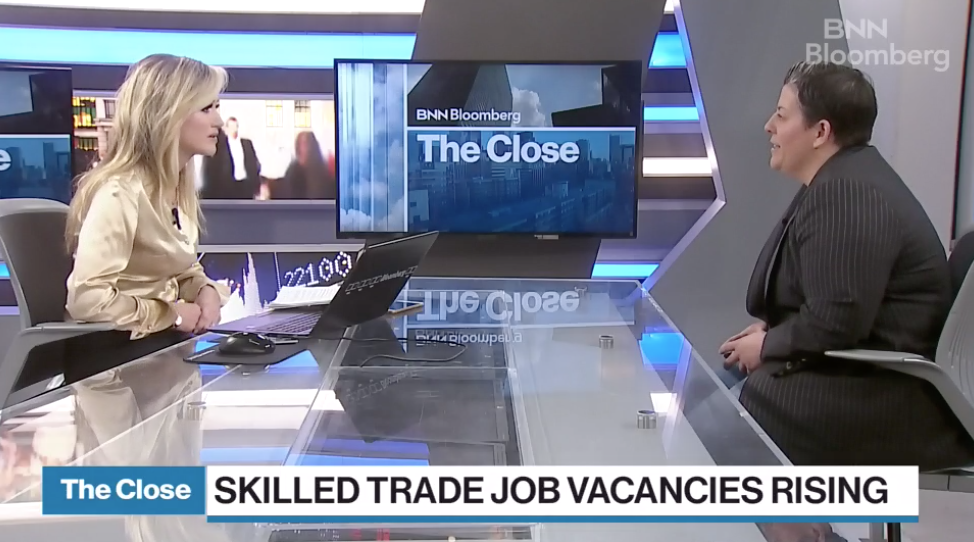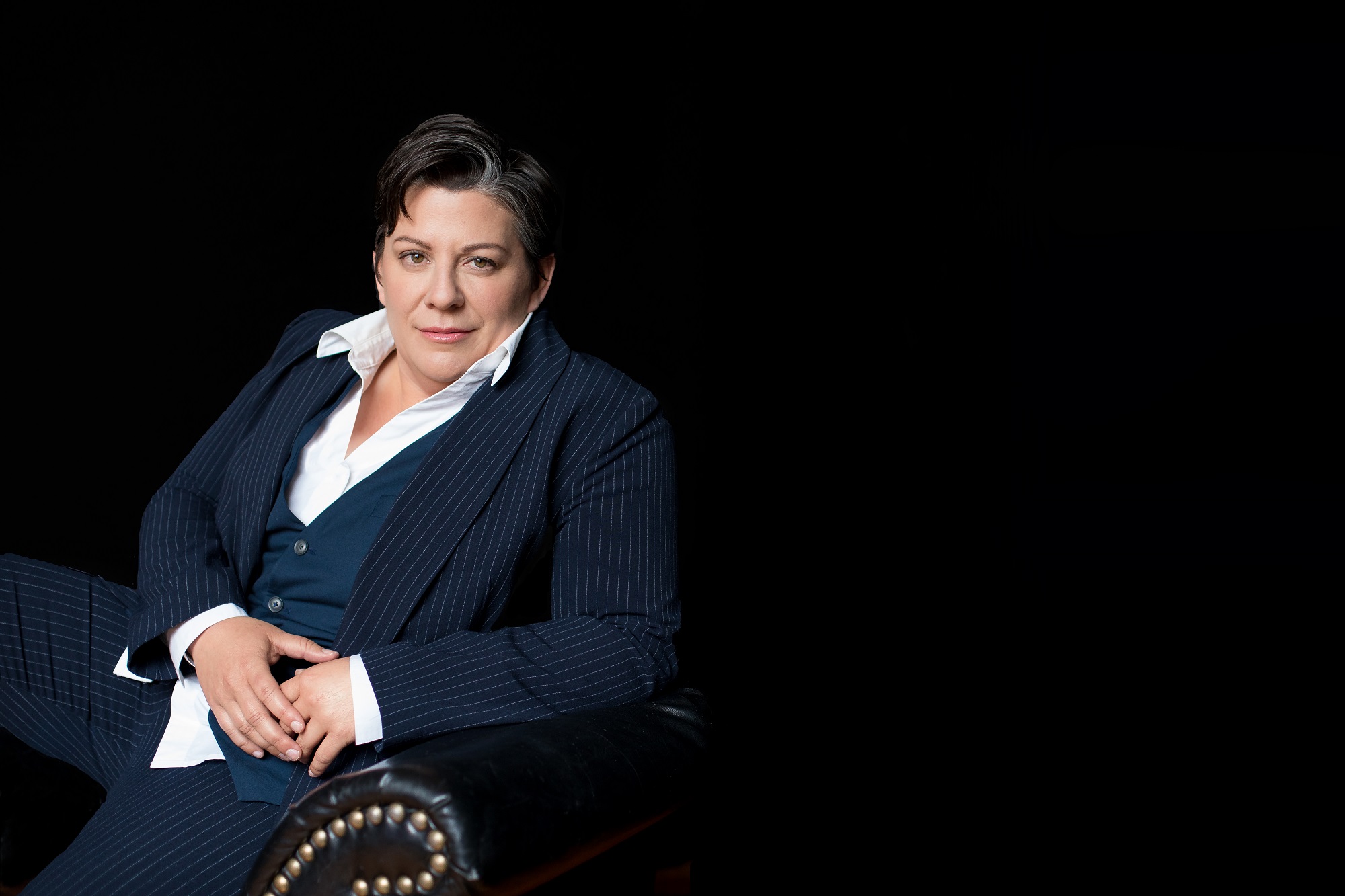From startups to restaurants to high-tech corporations, women are taking the business world by storm and leaving their mark. Here, we spend a day with Mandy Rennehan, the so-called “Blue-Collar CEO.”
At 4 p.m. on a cold and dreary Friday afternoon in downtown Toronto, Mandy Rennehan bursts into the green room of BNN. In classic Toronto style, everyone is avoiding eye contact with strangers, staring intently at their phones. Mandy immediately walks up to a young woman sitting alone. The woman is nervously awaiting her first live interview on BNN. She looks surprised when Mandy thrusts a hand towards her.
“I’m Mandy Rennehan,” she says in a thick east coast accent. “Nice to meet you.”
Mandy Rennehan is the CEO and founder of Freshco—not the grocery store— a Canadian reconstruction and retail maintenance provider. Rennehan started the company in Toronto when she was only 19 years old and had just moved to the city with all her possessions in a dirty hockey bag.
Mandy has dubbed herself the Blue-Collar CEO.. She has the phrase trademarked. She’s also trademarked , “redefining the collar, blue.”It’s all part of her mission to change the way the world sees blue collar workers
I spent a day following Mandy around, to see what it takes to go from Yarmouth, Nova Scotia to Bay Street.
YFC ⇒ YYZ


Mandy’s first stop of the day is delivering a keynote speech at the Ontario Council for Technology Education Conference. She arrives fresh off a flight from Fredericton. The previous night, Mandy received the CEO of the Year award from Atlantic Business Magazine, and this morning, she’s woken up at 3:30 am to inspire a group of high school science and technology teachers.
When I arrive, the only seat is at the very front. I sit with two high school teachers from Burlington. “I’ve seen her speak before,” one of the teachers says to her colleague. “She’s so great. I feel like I could hang out with her.”
Mandy takes the stage and turns a grey, windowless ballroom in the Hilton Mississauga Meadowvale Hilton into her own personal church of the blue collar worker.
She talks about growing up in Nova Scotia, and her father, who was a lobster fisherman. She tells the audience she’s a little bit gay, then later clarifies by assuring the men in the room they will never in a million years share a bed. She talks about how she has persevered, and how discrimination against those who work in the skilled trades needs to end.
Her speech is chock full of curses and expressions I’ve never heard before, the type of shit only an east coaster can get away with.
Her speech doesn’t seem to have any plan, and she doesn’t read from any notes. She jumps from topic to topic, and the only reason she stops talking is because she’s informed it’s time for questions from the audience. But none of that matters, because when she’s done speaking, everyone in the room is not only on her side, but also wants to be her best friend.
As soon as she finishes speaking, Mandy and her team make a beeline for the exit. I follow them out the door, but I hear a voice calling out from behind me.
“Hey, firecracker!”
A middle aged man has followed us out of Room A, and he could only be referring to one person. He catches up to us and starts to share his story with Mandy.
“I was a high school drop out.” he says. “And I was lost until I found trades. Your message is so inspiring.”
As Mandy chats with him for a moment, Lauren, Freshco’s VP of Social and Events leans in towards me.
“It’s like this everywhere we go,” she says. “If we don’t leave right away, she gets mobbed.”
She’s not exactly Mick Jagger, but the effect Mandy has on people is real.
Bringing the Maritimes to Oakville
After the keynote address, I accompany Mandy and her team to the Freshco office in Oakville. The first thing you see when you walk into the office is a wall of framed drawings of every Freshco employee, captioned with their nickname.
“I give everyone a nickname,” Mandy says. “I always know right away what someone’s nickname will be.”
Mandy’s nickname is Bear. It might be because she gives everyone she meets a bear hug. It could also be because she’ll mow you down if you get in her way.
Mandy and I sit down in her office for an interview. Her office is full of East Coast references: a light fixture above her desk that looks like a lobster trap, another lobster trap/shelf hybrid, and then the purely decorative lobster trap. Ok, most of the decor in her office is lobster trap related.
In our interview, Mandy and I talk about millennials (they’re fucking confused), women in trades (they kick ass), and her first job (selling bait to fishermen at age 10). She jumps from topic to topic, and if you can’t keep up, that’s not her problem.
During our conversation I feel equal parts frustrated and inspired. Frustrated because she’s not really answering my questions, she’s just responding with whatever happens to be going through her head at that particular moment. Inspired because her relentless positivity is making me feel like I could take on the world.
We talk a lot about the message Mandy is trying to spread: people who work blue-collar jobs are not inferior to people who work in an office.
“We need people to realize that this is not a second class industry,” Mandy says. “People who work in trades are perceived as workers and not professionals.”
This perception is what Mandy is trying to change. This is why she sleeps for two hours so she can give a keynote to educators. This is why after our interview she won’t go home for a nap. She’ll go to BNN for another interview, and do a phone interview with CBC on the ride there.
Mandy’s ideal world is one where the people who build the desks and the people who sit at them from 9 – 5 see each other as equals. Her biggest target is Bay Street.
“I need the boys and girls on Bay Street to loosen their ties and come down to earth,” Mandy says. “I need them to support the movement of changing the perception behind the industry. I need them to help make the blue collar industry a partner, and not an opponent.”
The camera loves her


After our interview, Mandy heads home to shower, catch up on emails, and get ready for her next interview.
We meet back up in the BNN lobby. When Mandy walks in, she immediately says hello to the security guard and receptionist. (We had all been avoiding eye contact with each other up until that point.)
“I LOVE your hair,” Mandy says to the receptionist as she signs in.
“How are you doing?” she asks the security guard as we head to the elevator. “I remember you from last time!”
In the green room, Mandy becomes instant best friends with everyone. The makeup artist, the girl who gets her water, the other guests on the show. The cynical, jaded city slicker in me tries to find her ulterior motive. Why on earth would anyone be so nice to every person they encounter? What is she getting out of this?
“This is the only way I know how to be,” she explains.
I’m not totally convinced. But I do notice that everyone who talks to Mandy Rennehan walks away with a smile.
In her interview, you would never know she’s been up since 3:30 am.
“I knew from a young age I was wired differently,” Mandy says to BNN anchor Catherine Murray. “I was wired to make money, inspire and lead.”
After the interview, Mandy tells me I should push my editor to get this story in print, not just online.
“You don’t see a lot of people like me on magazine covers!” she says.
An unconventional, gay, millionaire from Yarmouth, Nova Scotia — she’s right. I’ve never met anyone like Mandy Rennehan. Let alone see her on a magazine cover.








